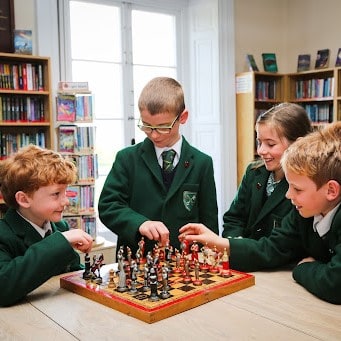Here at St Peter’s, we prioritise offering a varied curriculum, high-quality teaching and well-prepared lesson plans to produce the optimum learning environment for our pupils.
We acknowledge that the age of our pupils means that their cognitive development is of utmost importance, and will do everything in our power to ensure fantastic academic achievements across the board.
However, did you know there were certain steps that you, as parents, can take at home to boost your child’s brain power even more?
From healthy, nutritional meals to brain-training exercises; we’ve come up with seven ways you can help to boost your child’s brain power at home to increase the chance of outstanding academic results at school.
Food for Thought
It may come as no surprise that a healthy and balanced diet will work wonders in improving your child’s mental abilities.
Well-nourished children will perform better in every aspect of education; be it learning theorems or having enough energy to perform to the best of their abilities on the sports field.
In terms of specific foods, fish has been proven to contain brain-building fats while green vegetables help to protect brain cells from damage and mental fatigue. Eggs and citrus fruits such as oranges have both been shown to improve memory.
A healthy, hearty breakfast will improve their focus and concentration throughout a busy morning at school.
Have a look at this blog if you want more information on why cooking is good for a child’s development.
Encourage Your Child to Exercise
Children have high amounts of energy and ensuring that they have appropriate means of exertion is vital for them to refine their physical skills.
Physical activities will also contribute to your child getting a better-quality night’s sleep at the end of an action-packed day.
Team games and individual sports are great for building character and encourage the development of skills such as teamwork, whilst also enhancing concentration, clarity, thinking speed, problem-solving skills, creativity and mental and emotional energy.
If you’d like to know more about the benefits of physical activity, read our blog about how exercise impacts children in school.
Read to Your Child
It may come as no surprise that spending an extra fifteen minutes before bed reading to your child will have a positive impact on their attention span, vocabulary and memory, as well as promote bonding time.
They will automatically associate reading with spending time with you and will look back on this fondly in the years to come, making them more likely to continue reading in their own time as they grow up.
The Influence of Music on the Brain
Music and rhythm have been proven to improve academic performance and children often find it easier to concentrate on homework with instrumental music playing in the background.
Learning to play a new instrument from scratch teaches children about the importance of commitment and dedication, along with showing what you can achieve when you work hard on something.
Brain Training
Playing games and solving tasks that stimulate the mind is a fantastic, fun way to spend some quality time together as a family.
Card games, crosswords, puzzles, board games, spot the difference and maths puzzles are great ways to keep minds engaged. Also, these will increase their time away from the screen while exercising the capabilities of their brain in an interesting, fun way.
These also provide opportunities to keep track of your child’s cognitive development and how they approach the task at hand.
Ask Your Child Open-Ended Questions
Think about how you engage with your child. Use open-ended questions that require children to reply with long and detailed answers.
A good example is ‘Why do you think that happened?’ in response to a consequence of one of his or her actions.
Encouraging them to be self-critical and to evaluate what went wrong and why will help them to avoid repeating such mistakes in the future.
One Task at a Time
A recent study has found that children of primary school age find it particularly difficult to focus on more than one thing at once.
Avoid tasks that require them to divide their attention, and instead, encourage them to use their initiative and prioritise the order in which they complete things.
This makes rules such as ‘no TV whilst you’re doing homework’ even more crucial to adhere to and encourage your child to focus on one task at a time.
Checklists are a great way of keeping track of what they have done, what they have yet to do and a systematic approach that may be useful for them to revert to in later life.
We hope that these seven tips have given you a little more insight into how you can help to maximise your child’s academic performance.
Our private school in Devon will always provide the best education for our pupils, and with parents providing the optimum environment at home, your children are likely to flourish in all aspects of education.
If you’d like to learn more about St Peter’s, please do not hesitate to submit an enquiry. We would be happy to assist with any questions you may have. To find out more, please get in touch with Rachel Jupp, Director of Admissions & Marketing, on 01395 280335 or email rachel.jupp@stpetersprepschool.co.uk.










